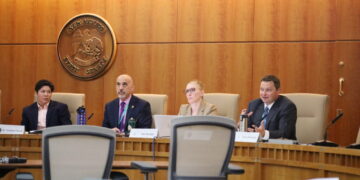State Sen. Brad Hudson, a Cape Fair Republican, listens during the first day of the 2025 legislative session — his first year as a state senator (Annelise Hanshaw/Missouri Independent).
Legislation that would bar Missouri universities from penalizing student groups for their beliefs faced pointed criticism during a Monday evening House committee hearing from Democrats who say it would open the door for discrimination and hate speech.
“Some people call it ‘religious beliefs,’ and some people call it ‘discrimination,’” said state Rep. Elizabeth Fuchs, a St. Louis Democrat.
State Sen. Brad Hudson, a Republican from Cape Fair, has sponsored the bill for four years. This is the first year he has presented it as a state senator, after it cleared the Missouri Senate for the first time last month.
Hudson worked with Democratic senators and added a provision to the bill that carves out viewpoints that “would materially and substantially disrupt the educational environment or interfere with the rights of others” from protection, avoiding a filibuster that could have doomed the legislation’s chances.
Similar proposals have been heard in the state legislature for a decade, passing both the House and a Senate committee in 2022 and 2023.
A nearly identical bill already passed the House in February on a 108-47 party-line vote.
GET THE MORNING HEADLINES.
Hudson said the bill codifies legal precedent allowing student groups to enforce religious beliefs under the protection of the First Amendment. Passing the bill, he said, would help the state avoid “needless litigation.”
Curtis Cole, campus access specialist with Chi Alpha Campus Ministries from Springfield, said his group has been threatened with removal from campuses for “holding biblically based views and standards of leadership.”
He alluded to a situation at the University of Virginia, where a student was kicked out of leadership for being in a same-sex relationship. More recently, a Chi Alpha chapter in Texas became the target of a lawsuit after a student accused a staff member of sexual assault. The staff member was a registered sex offender during his employment with Chi Alpha.
Cole said the bill was important to protect a “marketplace of ideas” on college campuses although “we’re going to disagree with each other from time to time.”
Fuchs said it went beyond disagreement and instead infringes on the rights of LGBTQ+ students.
“You want one group to be able to organize, to not be discriminated against, even if they’re organizing and discriminating against others,” she said.
Lance Kinzer, director of policy and government relations for the Washington, D.C.-based 1st Amendment Partnership, said the bill holds up to court precedents.
“It mirrors constitutional protections, and it really is just common sense,” he said.
State Rep. Wick Thomas, a Democrat from Kansas City, asked whether the bill would allow for beliefs that discriminate against other people groups.
“Wouldn’t this bill theoretically open it up for discrimination based on any sincerely held religious belief?” Thomas said. “If people believe in eugenics, they might say disabled people are not allowed to be in leadership in this organization.”
Kinzer felt judicial rulings set reasonable bounds.
“I don’t see a scenario where this would allow discrimination based upon someone being handicapped,” he said. “That is status-based and not really belief-based.”
The committee did not immediately take action on the bill Monday evening.
This post was originally authored and published by Annelise Hanshaw from Missouri Independent via RSS Feed. Join today to get your news feed on Nationwide Report®.



























